THE CURRENT BMW i SERIES.
Accompany us on a journey through the history of BMW electric cars. Since 2010, BMW i has been working on cars with fully electric and partially electric drives. And at the same time developing a new holistic approach to automotive engineering and sustainability. Discover the models of the BMW i series.
- 485 (659) kW (hp)
- 0–100 in 3.7 Sec
BMW i7 M70 xDrive Sedan.
BMW i7 M70 xDrive[1]: Energy consumption, combined WLTP in kWh/100 km: 23.3–20.8; Electric range, WLTP in km: 488–560
Provided technical data are measured according to the WLTP, not NEDC.
- up to 400 (544) kW (hp)
- 0–100 from 4.7 Sec
BMW i7 Sedan.
- up to 400 (544) kW (hp)
- 0–100 from 4.6 Sec
BMW iX.
- up to 286 hp
- 0–100 from 6.8 Sec
BMW iX3.
- up to 313 hp
- 0–100 from 5.6 Sec
BMW iX1.
FURTHER TOPICS.
OVERVIEW: THE HISTORY OF THE BMW I MODELS.
Discover the future of mobility right now. Sporty or powerful, a luxury saloon or a comfortable SUV: we have BMW i models for every situation.
BMW i5.
The BMW i5 is the all-electric version of the business saloon. Driving dynamics combine with a sporty design and intelligent driver assistance systems.
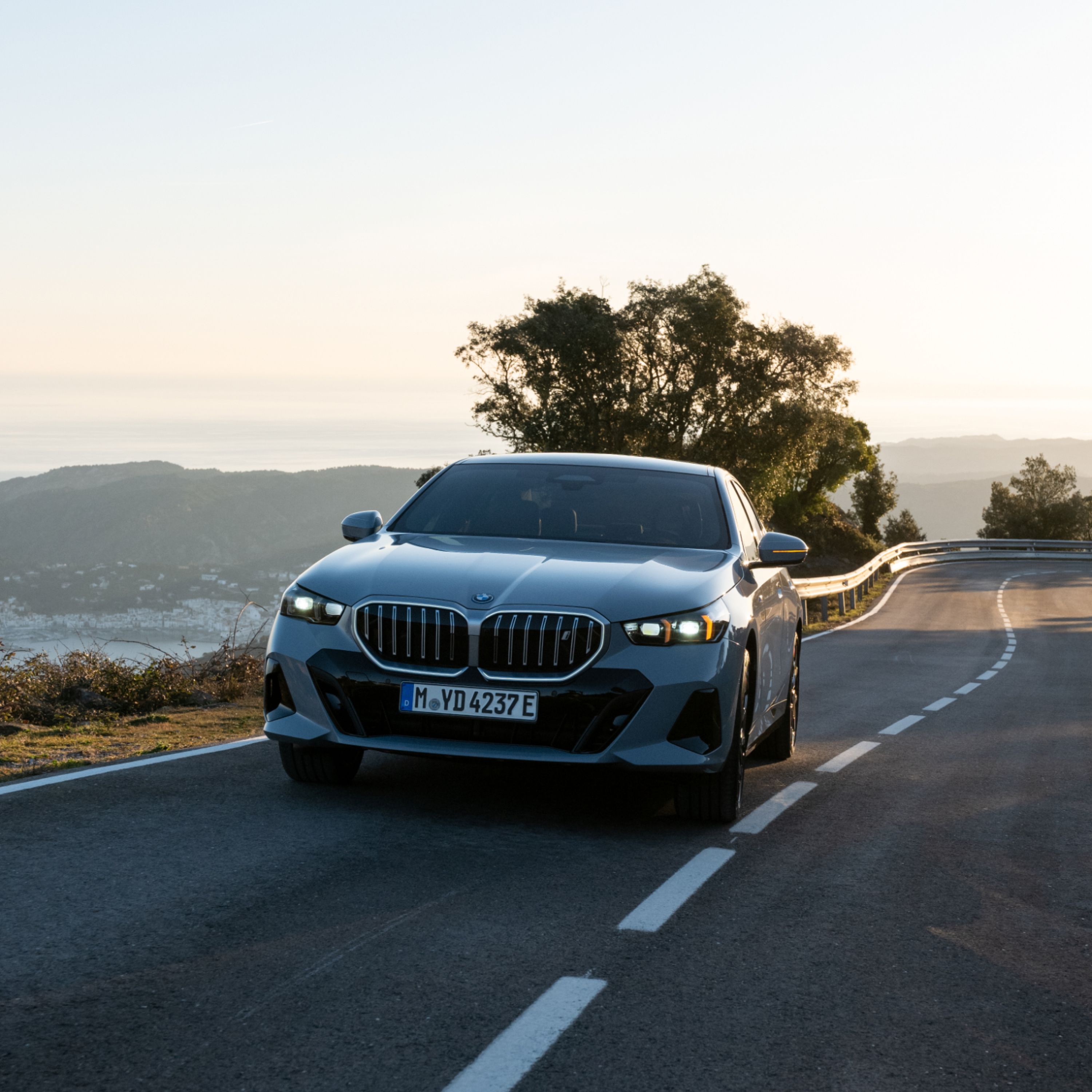
THE FIRST GENERATION (G60).
In 2023, the BMW i5 heralds a new age. It’s the first model in the BMW 5 Series with an all-electric drive system. With 250 kW (340 hp) of power, the BMW i5 eDrive40 is exciting and sporty to cruise in. Its range of 582 km[1] lends it everyday practicality and ensures peace of mind over long distances. Extensive assistance systems such as the Driving Assistant Professional and BMW Live Cockpit Professional ensure greater safety and comfort.
Visually, the BMW i5 follows in the successful footsteps of the BMW 5 Series, with functional design details added. Its appearance has the typical proportions of a BMW, with a long wheelbase, extended bonnet and flowing roofline. Highlights such as the illuminated BMW Iconic Glow kidney grille, large panoramic glass sunroof and crystalline Interaction Bar emphasize its luxurious nature.
BMW i5[1]: Energy consumption, combined WLTP in kWh/100 km: 18.9–15.9; Electric range, WLTP in km: 497–582
Provided technical data are measured according to the WLTP, not NEDC.
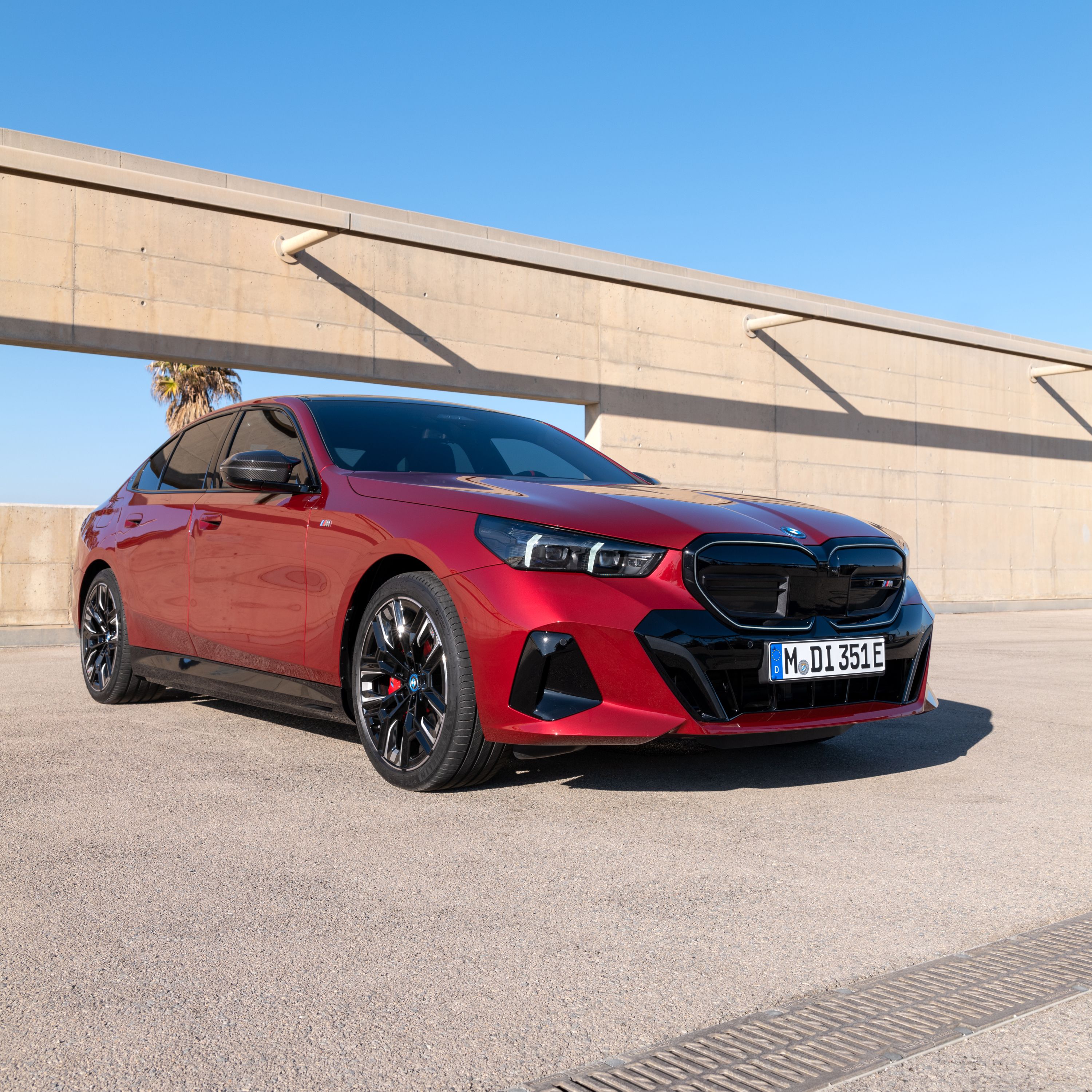
BMW i5 M60 (G60).
The BMW i5 M60 delivers the power of a BMW M. A sprightly 442 kW (601 hp) translates to a maximum speed of 230 km/h. It can sprint from 0 to 100 km/h in just 3.8 seconds. And thanks to the BMW M Sport braking system, it stops quickly as well. The intelligent BMW xDrive all-wheel drive adapts the vehicle to new conditions in fractions of a second. The result is optimum traction and stability. The Integral Active Steering is equally flexible – nimble when parking and stable at high speeds. With a purely electric range of up to 516 km[1], it’s ideally equipped for both everyday trips and long journeys.
Visually, the performance of the BMW i5 M60 is reflected in its appearance. At night, in particular, the illuminated radiator grille with BMW kidney Iconic Glow is a real eye-catcher. If desired, the exterior can be further enhanced with carbon parts, such as painstakingly handmade exterior mirrors. Or the M rear spoiler, which makes the vehicle even more stable at high speeds.
The interior is sporty as well. Breathable sports seats offer optimum support. Iconic M-style indicators enhance the instrument display for an exciting and dynamic look. If desired, the cockpit can be transformed into a concert hall, with the optional Bowers & Wilkins Surround Sound System. 17 loudspeakers and 655 watts give the full range of emotion to your favourite songs.
BMW i5 M60 xDrive[1]: Energy consumption, combined WLTP in kWh/100 km: 20.6–18.2; Electric range, WLTP in km: 455–516
Provided technical data are measured according to the WLTP, not NEDC.
BMW i7.
The BMW i7 is the first all-electric luxury saloon. It combines electric performance and exciting entertainment to create an unforgettable driving experience.
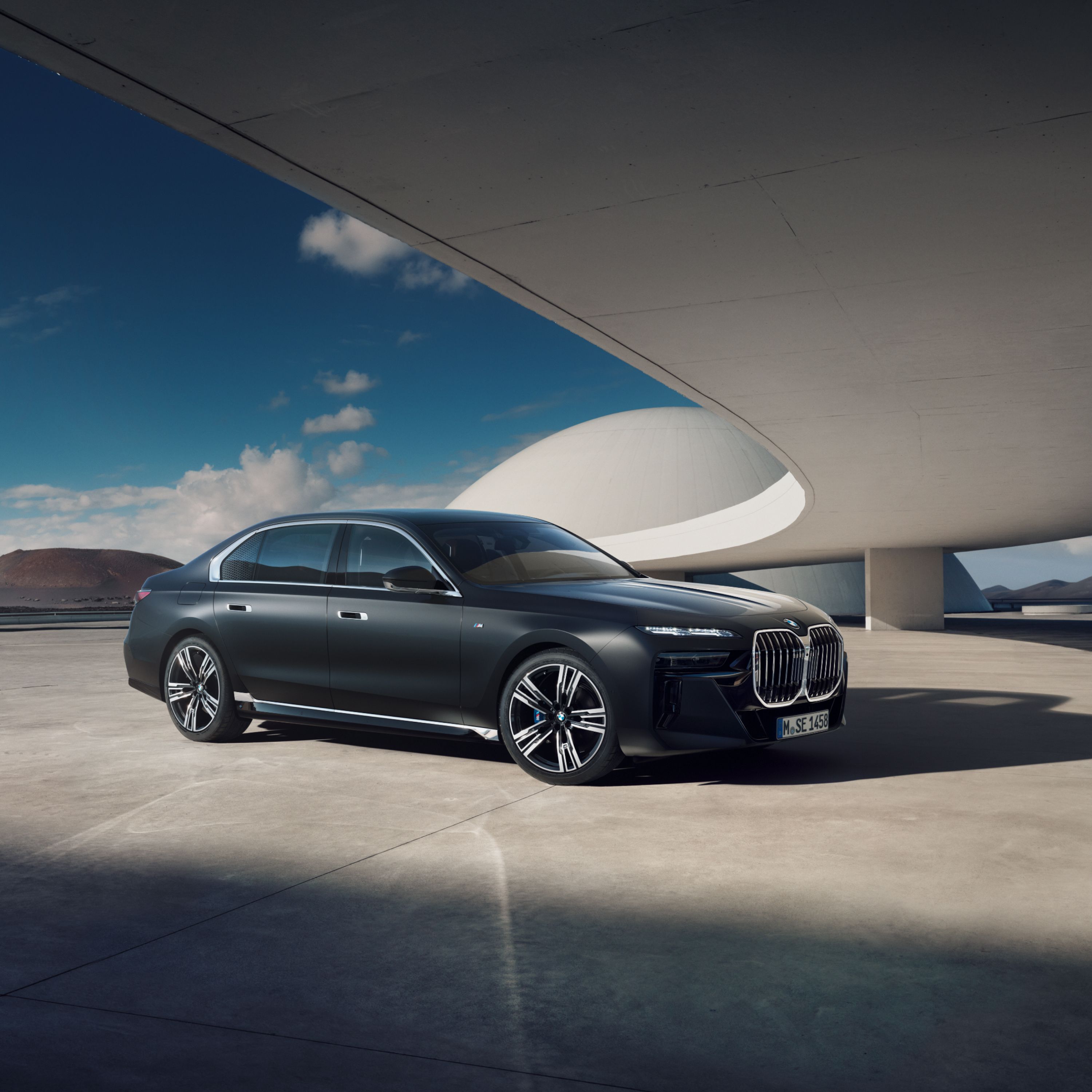
THE FIRST GENERATION (G70).
The BMW i7 is the face of a new luxury class. Since 2022, it has shown that elegance, outstanding driving characteristics and sustainability deliver more than the sum of their parts.
The exterior speaks a monolithic design language, while the iconic front grabs the attention. Illuminated kidney grilles really make an impression. Streamlined, two-piece LED headlights exude elegance. A premium version is also available if desired: BMW Iconic Glow crystal headlights with backlit Swarovski crystals. Combined with the impressive “Great Entrance Moments” lighting effects, the driver welcome provides unforgettable moments.
High-quality materials embellish the interior. Merino leather, cashmere wool and Swarovski crystals convey an air of luxury. The multifunctional crystal element of the BMW Interaction Bar combines both visual and touch control. Together with the high-resolution 14.9" BMW Curved Display, the result is a unique multimedia cockpit.
Passengers enjoy complete comfort in the new BMW i7 as well. The ample 31.3" BMW Theatre Screen creates a large-scale cinema ambience. With the crystal-clear 4D audio of the Bowers & Wilkins Diamond Surround Sound System, rear seat occupants are immersed in a unique experience for the eyes and ears.
A masterful 400 kW (544 hp) enables the BMW i7 xDrive60 to achieve an all-electric range of up to 625 km[1], with no emissions when driving locally and almost no sound. Instead, the acoustic atmosphere is provided by BMW IconicSounds Electric. This unique soundtrack to accompany every drive mode was composed by Hans Zimmer.
Production period: since 2022
Overall vehicle drive, performance in kW (hp): electric motor, 335–485 kW (455–659 hp)
Length/width/height in mm: 5,391 / 1,950 / 1,544
BMW i7[1]: Energy consumption, combined WLTP in kWh/100 km: 23.7–18.4; Electric range, WLTP in km: 490–625
Provided technical data are measured according to the WLTP, not NEDC.
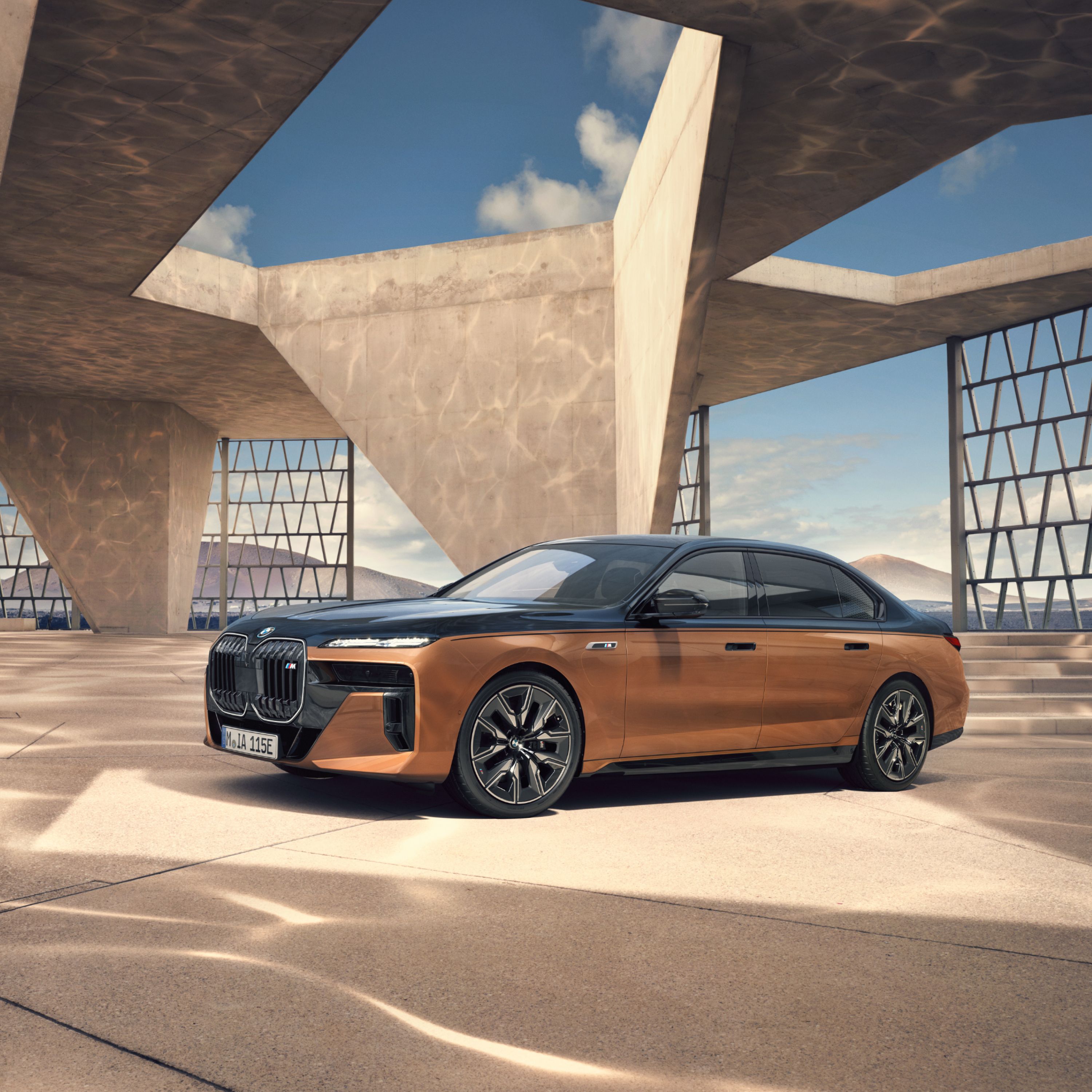
BMW i7 M70 (G70).
In 2023, the new electric luxury class BMW i7 meets the powerful performance of the BMW M. The result is the BMW i7 M70. Its powerful BMW M eDrive motor with 485 kW (659 hp) accelerates from 0 to 100 km/h in just 3.7 seconds. The Executive Drive Pro included as standard further enhances the driving dynamics with Integral Active Steering and adaptive 2-axle air suspension. At the same time, efficiency is increased by a lightweight structure and aerodynamic design, propelling the BMW i7 M70 to a range of up to 559 km[1]. This way, you’ll arrive at any everyday destination using the electric motor only, with no emissions when driving locally and almost no sound.
The exterior reflects these impressive characteristics for all to see. The extended M High-gloss Shadowline exterior trim conveys an air of exclusivity in glossy Black. The aerodynamically optimised M rear spoiler and black M Sport braking system demonstrate that this car is ready for action. Seen from the front, the striking kidney grille radiates a strong personality, especially in combination with the Iconic Glow kidney illumination – a real eye-catcher, especially at night. By day, optional BMW Individual two-tone paintwork is a unique feature that grabs everyone’s attention.
Sporty and elegant on the outside, comfortable and luxurious on the inside. The atmosphere is enhanced by high-quality materials such as cashmere wool and Swarovski crystals. These are coupled with innovative technologies, such as the BMW Interaction Bar and BMW Curved Display. In the rear seat, the large 31.3" BMW Theatre Screen sends passengers on a visual, cinematic journey, naturally accompanied by the 4D audio of the optional Bowers & Wilkins Diamond Surround Sound System.
Production period: since 2023
Overall vehicle drive, performance in kW (hp): electric motor, 485 kW (659 hp)
Length/width/height in mm: 5,391 / 1,950 / 1,544
BMW i7 M70 xDrive[1]: Energy consumption, combined WLTP in kWh/100 km: 23.7–20.8; Electric range, WLTP in km: 488–560
Provided technical data are measured according to the WLTP, not NEDC.
BMW iX.
The vehicle of a new generation. The all-electric BMW iX offers sustainable luxury. Elegant minimalism. State-of-the-art motor technology. Here, maximum comfort meets a monolithic design and a unique feeling of spaciousness.
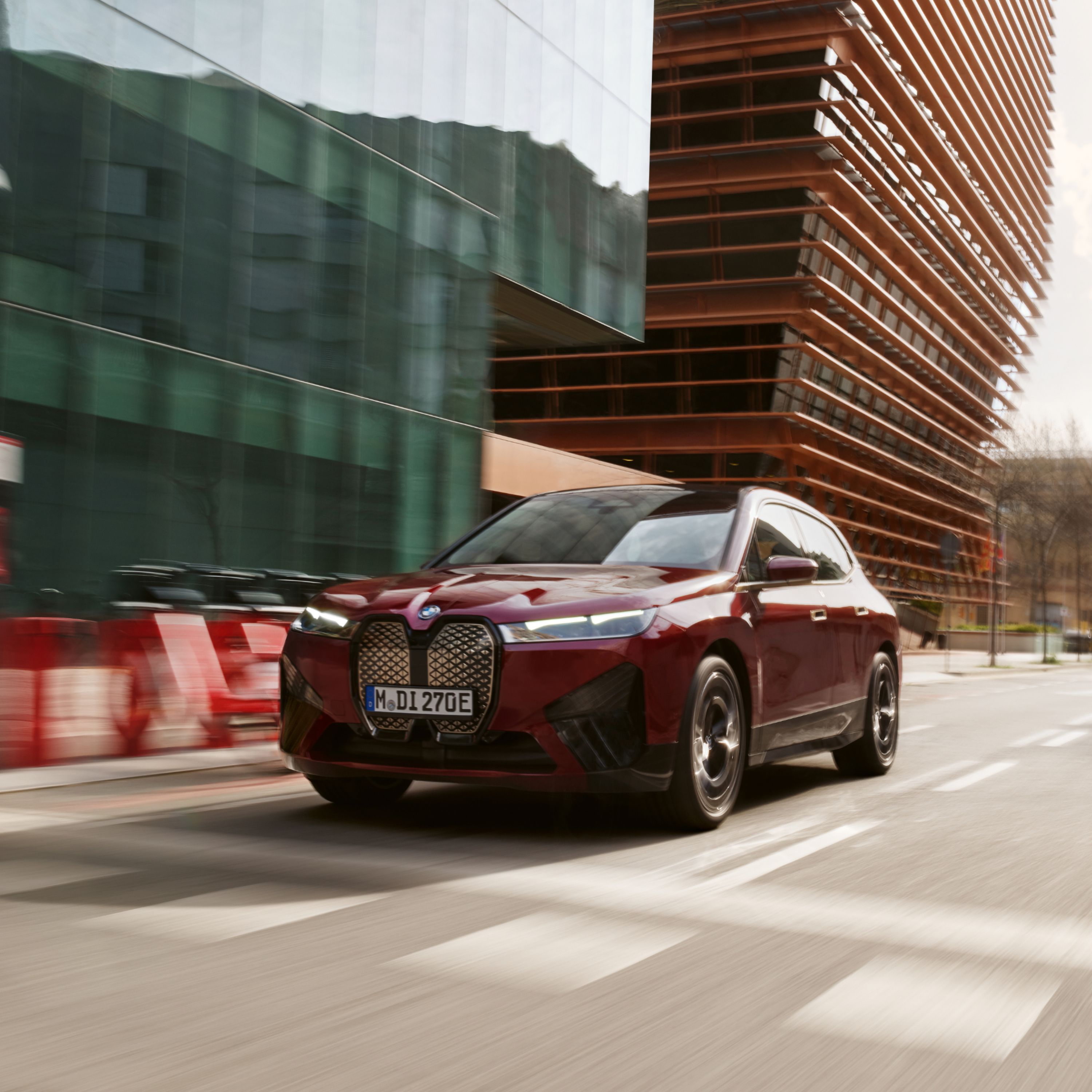
THE FIRST GENERATION (i20).
The pioneering spirit of the BMW iX is already apparent from the outside. Just a few very characterful lines accentuate its purist shape. Seamlessly integrated details further enhance this effect. The twin headlights are the narrowest that BMW has ever installed. An expressive, vertical BMW kidney grille completes the T-shape of the front. Flush-mounted door handles, frameless doors and square wheel arches convey an image of extravagance from the side, too.
But the BMW iX boasts impressive technology as well. Two powerful electric motors and the electric BMW xDrive all-wheel drive merge the DNA of a BMW X with an electric drive system. The BMW iX xDrive40 version delivers a performance of 240 kW (362 hp) over a range of up to 564 km[1]. Meanwhile, the BMW iX xDrive50 is even more powerful, with 385 kW (523 hp) over a distance of up to 435 km[1]. At quick-charging stations, both cars get from 10 to 80 percent in under 40 minutes[2]. And in both, innovative technologies such as the BMW iDrive and extensive assistance and entertainment systems are also on board.
Production period: since 2021
Overall vehicle drive, performance in kW (hp): electric motor, 240–455 kW (326–619 hp)[3]
Length/width/height in mm: 4,953 / 1,967 / 1,695–1,696
BMW iX[1]: Energy consumption, combined WLTP in kWh/100 km: 24.7–19.4; Electric range, WLTP in km: 403–633
Provided technical data are measured according to the WLTP, not NEDC.
BMW i4.
The BMW i4 is BMW’s first all-electric Gran Coupé. Here, excellent, electrically powered driving dynamics, comfort and everyday practicality are redefined. As the powerful BMW i4 M50, it embodies the DNA of the BMW M.
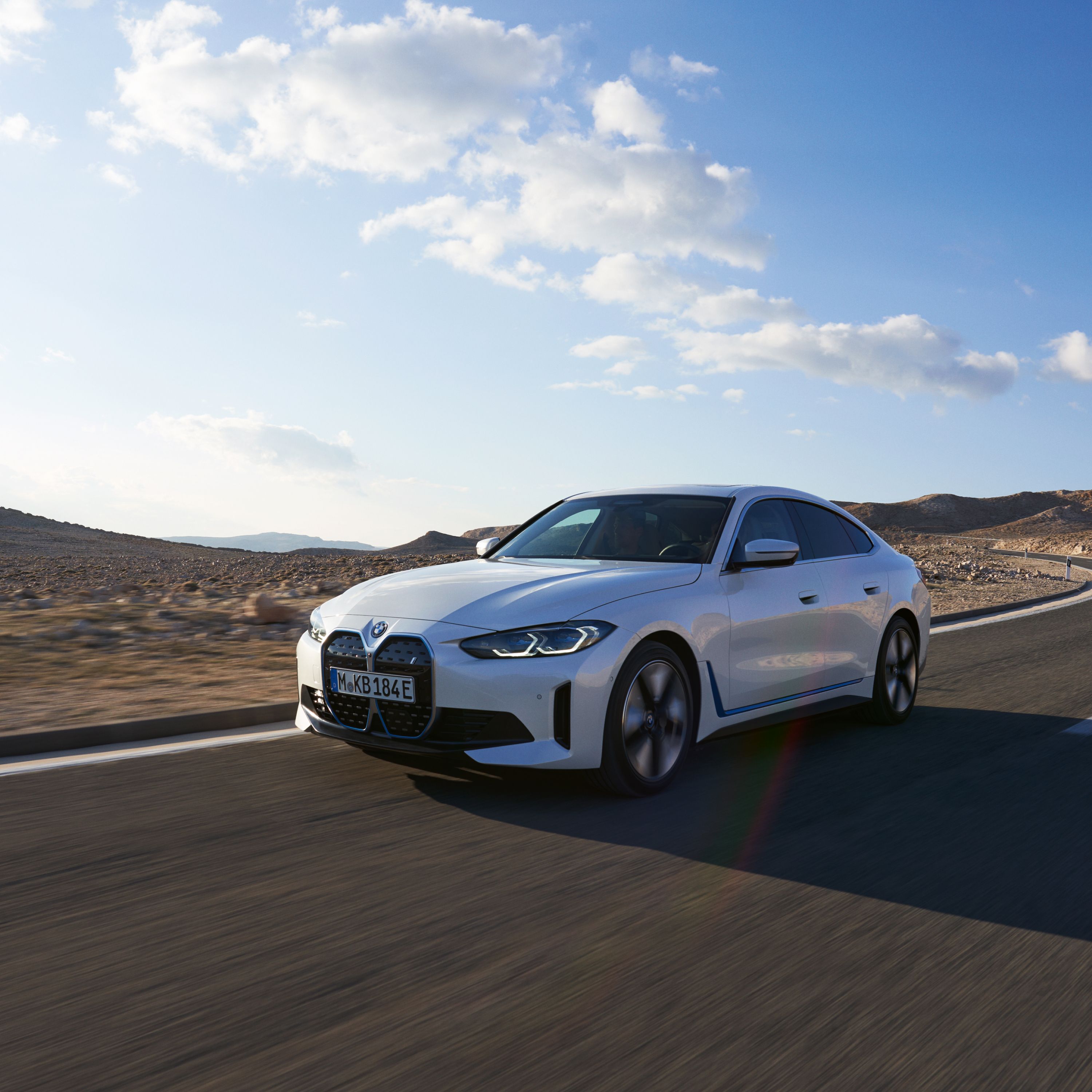
THE FIRST GENERATION (G26).
The all-electric BMW i4 Gran Coupé conveys an impressive and self-assured air. Its design presents its innovative nature to the outside world. The kidney grille is vertical, the headlights are at a dynamic, oblique angle, and the rear wheel arches generously accentuate the car’s width.
The BMW i4 eDrive40 Gran Coupé delivers 250 kW (430 hp) and the immediately available maximum torque promises a sporty electric driving experience. Its innovative drive concept keeps it constantly efficient as well. And comfort is also ideal, as the BMW i4 Gran Coupé glides almost silently through the streets.
What’s more, with its optimised weight distribution and harmonised chassis and drive components, the steering is exceptionally pleasant and precise. The range is up to 589 kilometres[1], getting you to all the usual everyday destinations.
Production period: since 2021
Overall vehicle drive, performance in kW (hp): electric motor, 210–400 (286–544)
Length/width/height in mm: 4,783 / 1,852 / 1,448
BMW i4[1]: Energy consumption, combined WLTP in kWh/100 km: 22,5–15,8; Electric range, WLTP in km: 406–589
Provided technical data are measured according to the WLTP, not NEDC.
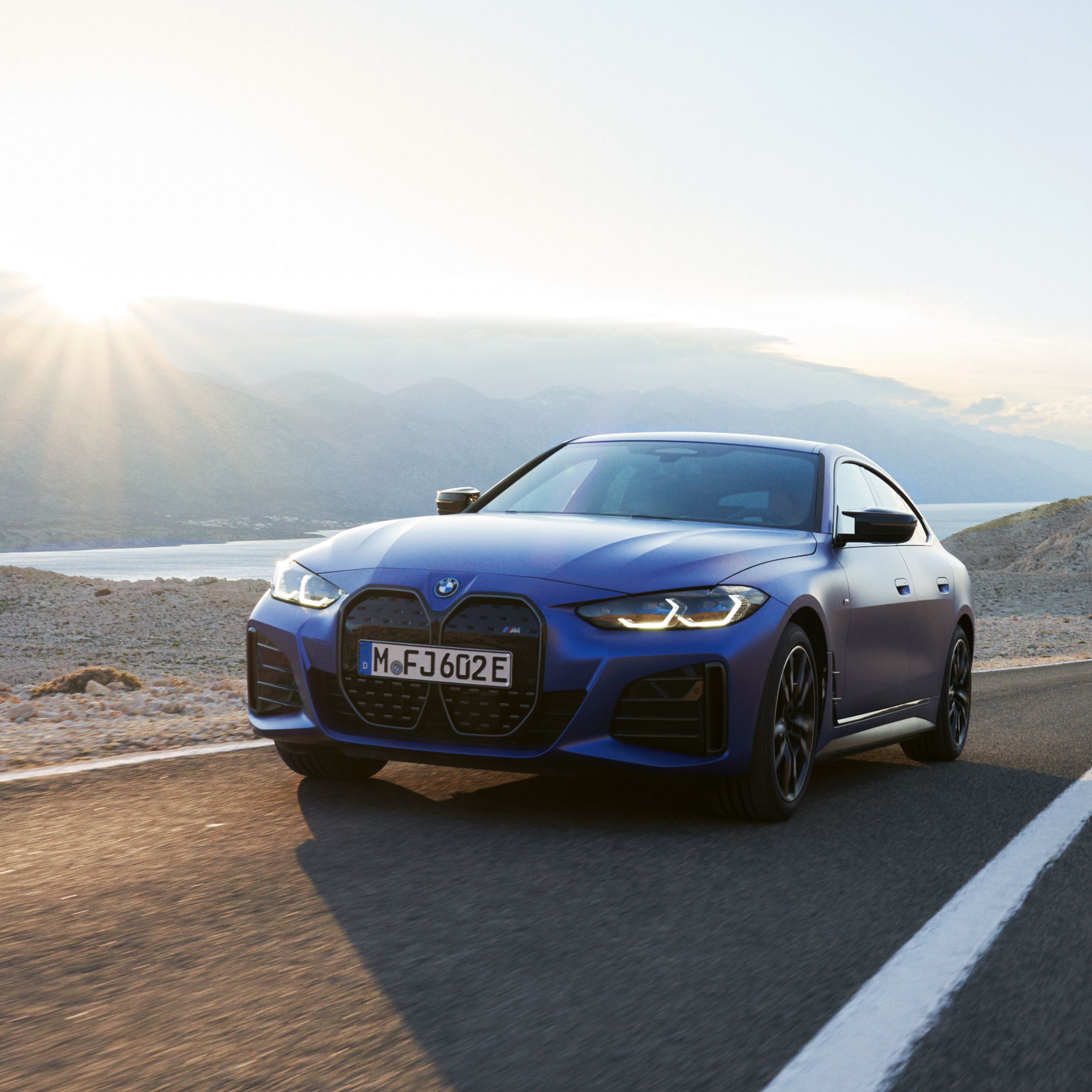
BMW i4 M50 (G26).
The BMW i4 M50 offers the sporty performance of a BMW M – powered fully by electricity. It is driven by two fifth-generation BMW M eDrive motors. In Sport Boost mode, it delivers a powerful 400 kW (544 hp), seamlessly catapulting it from 0 to 100 km/h in just 3.9 seconds, accompanied by the expressive soundtrack of BMW M IconicSounds Electric. The high-performance M Sport braking system brings it just as powerfully to a stop. The Adaptive M suspension, installed as standard, ensures maximum precision and also peace of mind, because the fully electric range of up to 519 kilometres[1] means that long distances are no problem either.
On the exterior, this fusion of BMW M and BMW i is evident not just in details like the M logo in the kidney grille or the iconic BMW i blue ring around the BMW logo – the entire design is aerodynamically optimised, from the enclosed M kidney grille to the expressive diffuser elements and M rear spoiler.
A glance inside the interior reveals a consistently driver-oriented cockpit. The BMW Curved Display is wholly facing the driver. Combined with the streamlined instrument panel, it creates a clear, modern look. The M steering wheel with contrasting stitching in M colours has a sporty appearance but is also pleasingly grippy. The breathable M Sport seats ensure comfort for all passengers. Even if their pulse is quickening!
Production period: since 2021
Overall vehicle drive, performance in kW (hp): 400 (544)
Length/width/height in mm: 4,783 / 1,852 / 1,448
BMW i4 M50[1]: Energy consumption, combined WLTP in kWh/100 km: 22.5–18.1; Electric range, WLTP in km: 414–519
Provided technical data are measured according to the WLTP, not NEDC.
BMW iX3.
As the first all-electric SUV, the BMW iX3 combines sustainable technologies with tried-and-tested SUV characteristics to be comfortable, robust and powerful. Intelligent charging solutions meet maximum driving dynamics. The clear, powerful contours of the design round off the overall picture.
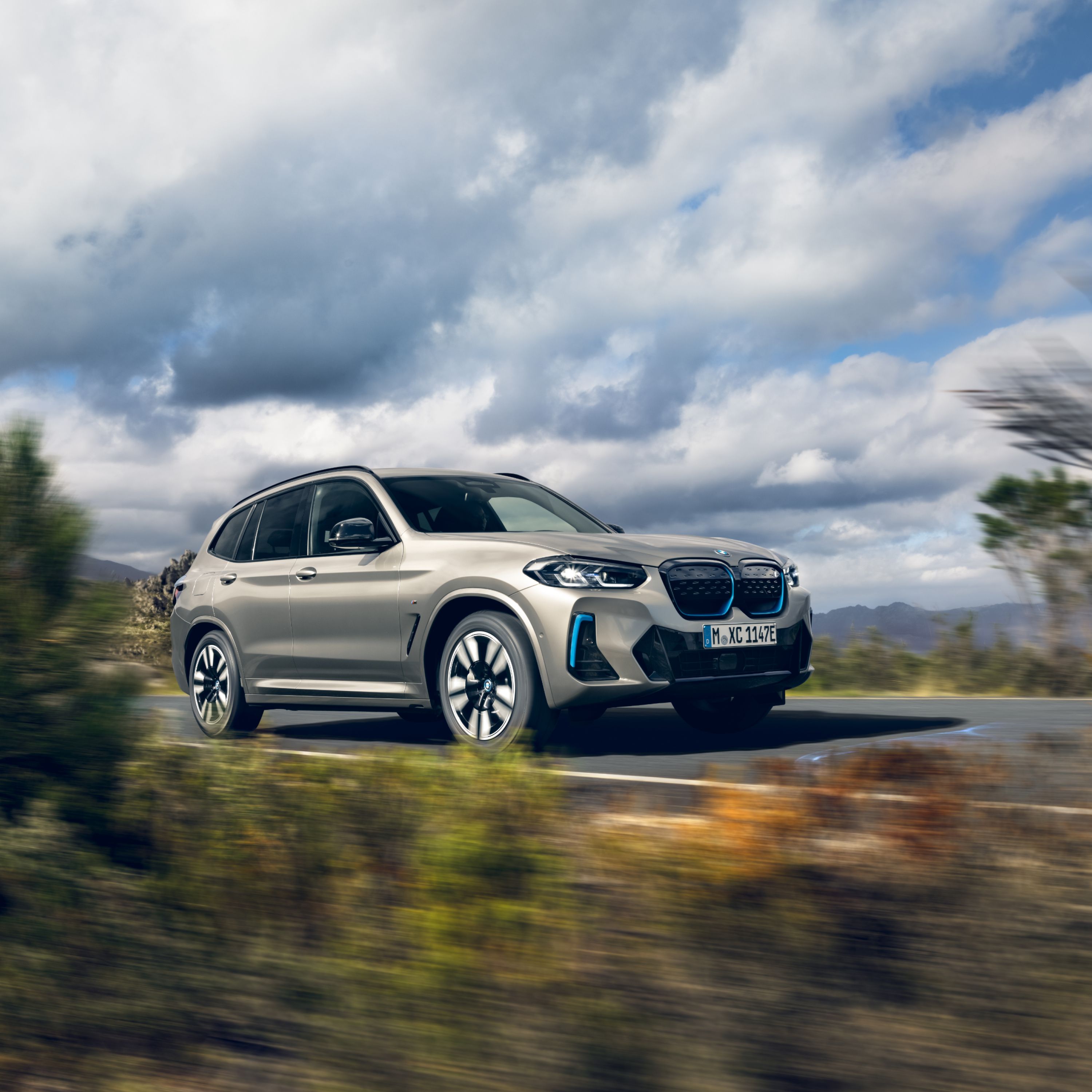
THE FIRST GENERATION (G08).
The BMW iX3 with electric drive first comes on the scene in 2021. Even at first sight, the iconic BMW i kidney grilles confidently flaunt the car’s electric nature. Inside, the ambient lighting preset to BMW i Blue as standard gives an air of sustainability. The innovative drive is started by the blue Start/Stop knob. Its responsible approach goes even deeper than this: the electric drive of the BMW iX3 manages entirely without rare earth metals, but at 120–210 kW (163–286 hp) it’s also exceptionally powerful. The sensitivity of braking regeneration, i.e. the recuperation of brake energy, can be set to four different levels to suit your desired driving style. This way, the BMW iX3 can travel up to 461 km[1]. And on the way, it can simply be recharged from 10 to 80 percent[2] in about 31 minutes at a quick-charging station.
Production period: since 2020
Overall vehicle drive, performance in kW (hp): electric motor, 120–210 (163–286)
Length/width/height in mm: 4,734 /1,891 /1,668
BMW iX3[1]: Energy consumption, combined WLTP in kWh/100 km: 18.9–18.5; Electric range, WLTP in km: 453–461
Provided technical data are measured according to the WLTP, not NEDC.
BMW iX1.
The BMW iX1 is BMW’s first compact SUV. The design is both modern and self-confident. Striking proportions meet a monolithic design language. The driving dynamics are powerful and efficient thanks to the BMW eDrive.
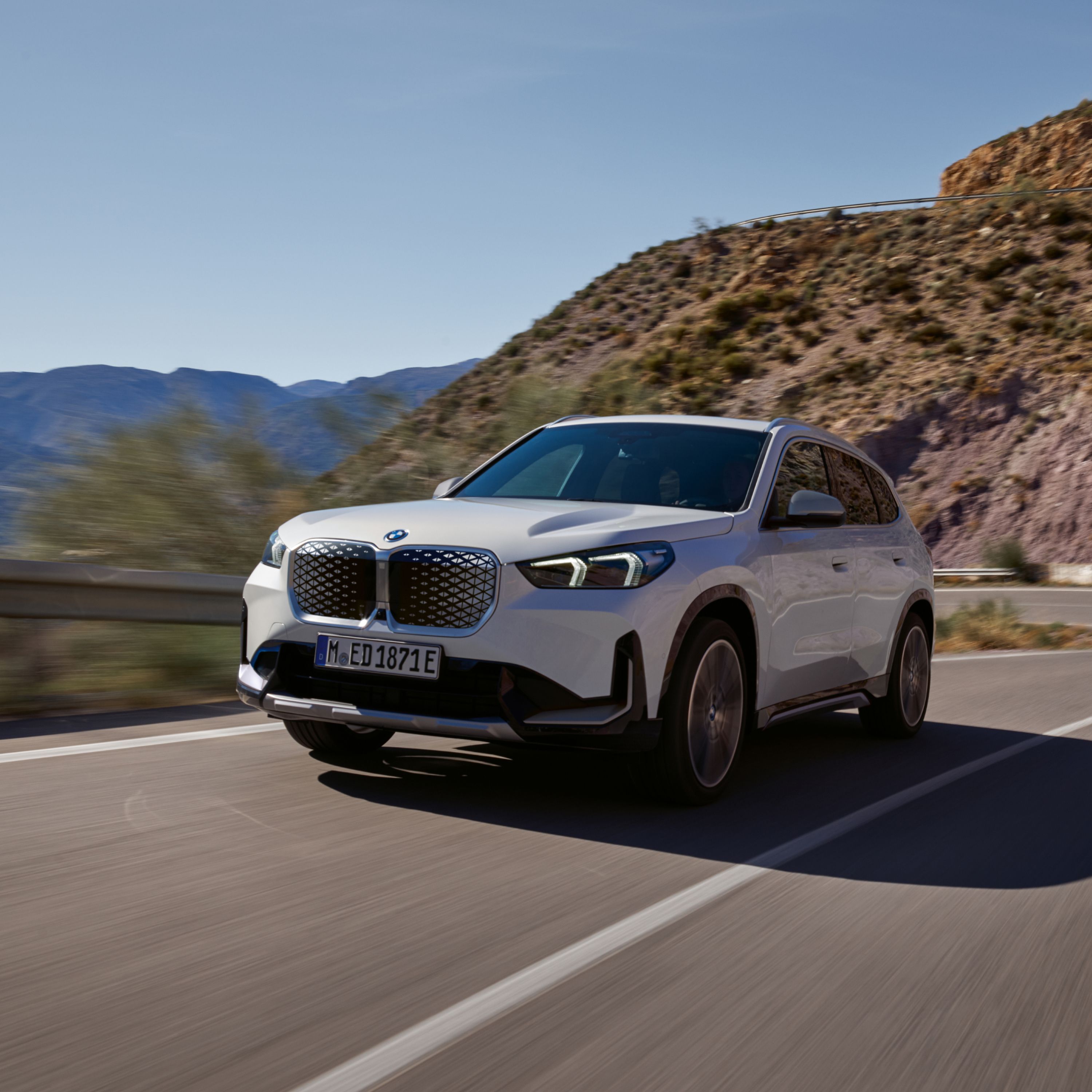
THE FIRST GENERATION (U11).
The BMW iX1 hits the market in 2022. As the first all-electric compact SAV, it is the electric entry-level model among BMW X vehicles.
On the one hand, it has the powerful readiness to spring into action typical of a BMW X. On the other hand, it boasts the efficiency of BMW eDrive technology. It has an especially flat high-voltage battery, which is installed in the underbody. And an effective recuperation system, which recovers energy generated by braking.
From the outside, the BMW iX1 emanates sportiness with powerful upright proportions and a prominent front end. At the model launch, blue accents reflect the innovative drive technology under the bonnet. In the modern interior, even longer journeys are a delight. Passengers can enjoy active seats that are individually, electrically adjustable. The elegant, frameless BMW Curved Display enables intuitive control by voice and touch. This is also the interface to the powerful BMW iDrive.
Production period: since 2022
Overall vehicle drive, performance in kW (hp): electric motor, 230 kW (313 hp)[3]
Length/width/height in mm: 4,500 / 1,845 / 1,616
BMW iX1[1]: Energy consumption, combined WLTP in kWh/100 km: 18.1–16.9; Electric range, WLTP in km: 417–439
Provided technical data are measured according to the WLTP, not NEDC.
BMW i3.
The BMW i3 is a pioneer. Since its launch, it has combined exceptional driving dynamics with future-oriented technology. The intelligent use of recycled materials brings sustainability to the fore.
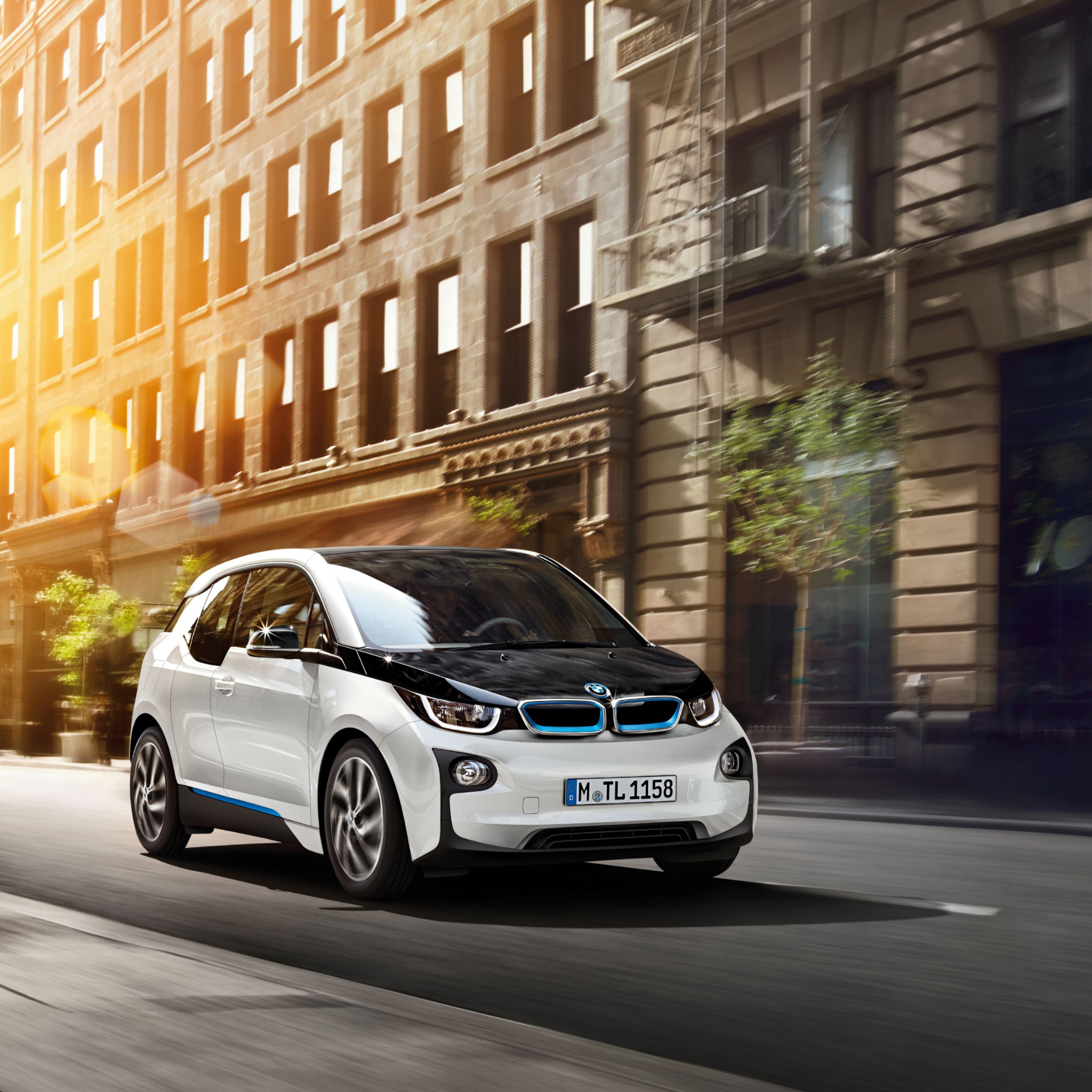
THE FIRST GENERATION (i01).
The BMW i3 comes onto the market in 2013. Not only is it the first electric BMW in standard production – it’s also the very first production vehicle to combine a passenger cell of carbon-fibre-reinforced plastic with an aluminium chassis. This means it weighs exactly the same as a conventional compact car with combustion engine – despite the battery. In addition, many of its parts are made from renewable raw materials.
Its electric motor achieves a performance of 125 kW (170 hp). The torque conveys the full force of electric power even at the slightest touch of the pedal. In 2017, along comes the BMW i3s with 10 kW (14 hp) more. Meaning it can accelerate from 0 to 100 km/h in 6.9 seconds, 0.4 seconds faster than the BMW i3.
A 33.2 kWh battery is added in 2016. And in 2018, this capacity increases all the way up to 42.2 kWh. Now the BMW i3 achieves a range of 307 km (WLTP)[1]. At a quick-charging station with more than 50 kW, it is fully charged in a mere 1.4 hours. Over 250,000 BMW i3 and BMW i3s vehicles have rolled off the production line and onto roads around the world.
Production period: 2013 – 2022
Overall vehicle drive, performance in kW (hp): electric motor, 125–135 (170–184), optionally available with Range Extender up to 2018 (petrol engine 0.65 litres, 28 kW (38 hp)
Length/width/height in mm: 3,999–4,011 / 1,775 / 1,578
BMW i3[1] [4]: Energy consumption, combined WLTP in kWh/100 km: 16.6–15.3; Electric range, WLTP in km: 278–307
Provided technical data are measured according to the WLTP, not NEDC.
BMW i8.
The BMW i8 is the first production sports car with plug-in hybrid drive. At the International Motor Show in 2009, for the first time a consistently sustainable approach is united with outstanding driving characteristics in a single concept, combined with a futuristic and assertive design.
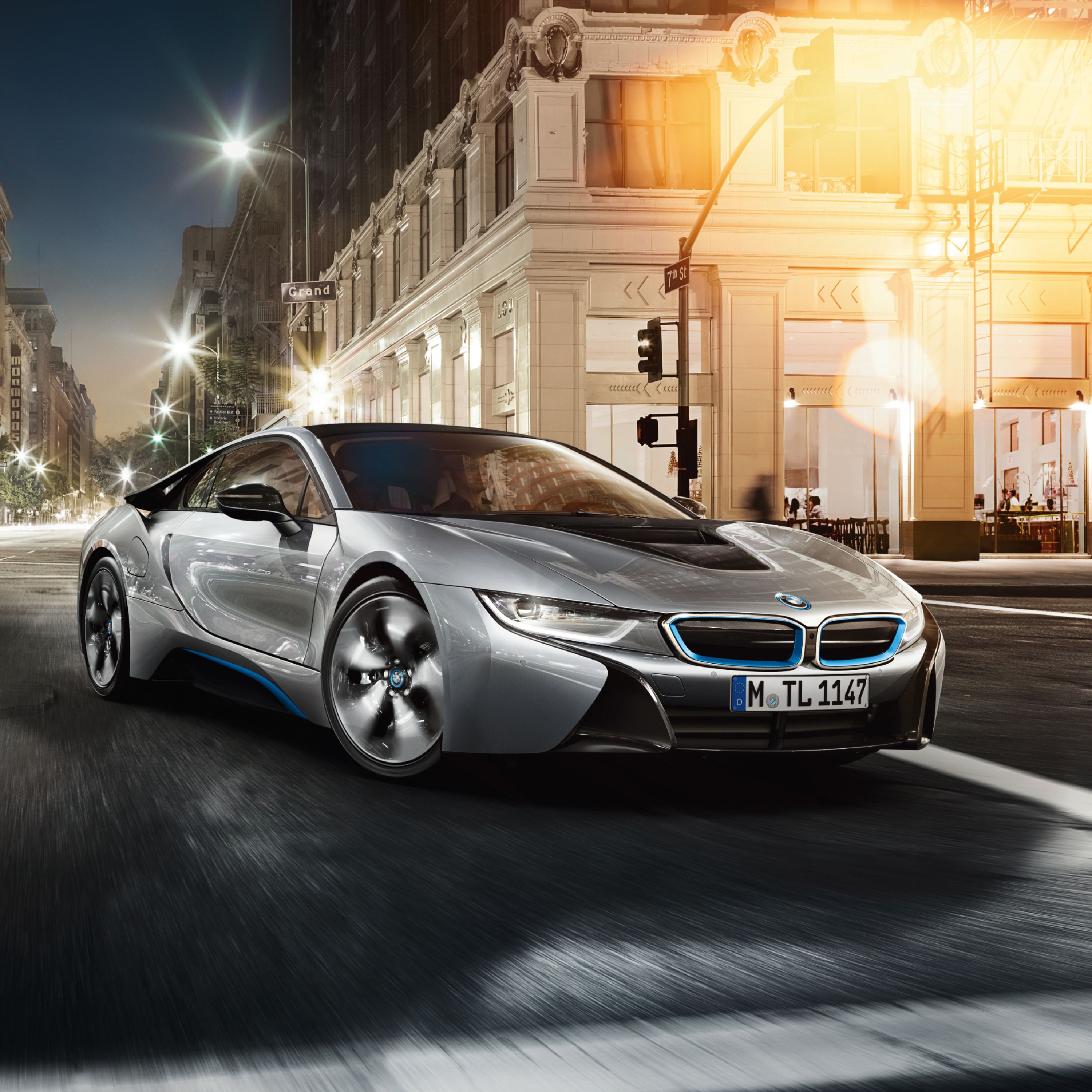
THE FIRST GENERATION (i12, i15).
The BMW i8 is propelled by an innovative hybrid engine, with electric front-wheel drive and a BMW TwinPower Turbo 3-cylinder petrol engine driving the rear wheels. As a result, it only consumes the same amount of petrol as a small car but packs the driving performance of a sports car. The coupé manages a maximum speed of 120 km/h purely with the electric motor. Up to 2019, the combined power is 266 kW (362 hp), and after this it climbs to as much as 275 kW (374 hp).
Visually, too, the BMW i8 raises the bar. It’s the first production vehicle with laser lights, and is also available as a Roadster from 2018. In total, 20,500 of these landmark vehicles were built.
Production period: 2013 – 2020
Overall vehicle drive, performance in kW (hp): petrol plug-in hybrid engine 266–275 (362–374)
Length/width/height in mm: 4,689 / 1,942 / 1,289–1,291
Electric range, NEDC in km: up to 55 kilometres
FREQUENTLY ASKED QUESTIONS.
Consumption and CO2 emissions.
BMW i7 M70 xDrive Sedan[1]:
Energy consumption, combined WLTP in kWh/100 km: 23.7–20.8;
Electric range, WLTP in km: 488–560
BMW i7 xDrive60 Sedan[1]:
Energy consumption, combined WLTP in kWh/100 km: 19.6–18.4;
Electric range, WLTP in km: 591–625
BMW i7 eDrive50 Sedan[1]:
Energy consumption, combined WLTP in kWh/100 km: 20,3−19,1;
Electric range, WLTP in km: 575 − 611
BMW i5 M60 xDrive Sedan[1]:
Energy consumption, combined WLTP in kWh/100 km: 20.6–18.2;
Electric range, WLTP in km: 455–516
BMW i5 eDrive40 Sedan[1]:
Energy consumption, combined WLTP in kWh/100 km: 18.9–15.9;
Electric range, WLTP in km: 497−582
BMW i4 M50 Gran Coupé[1]:
Energy consumption, combined WLTP in kWh/100 km: 22.5–18;
Electric range, WLTP in km: 415–520
BMW i4 eDrive40[1]:
Energy consumption, combined WLTP in kWh/100 km: 19.1 - 16.1;
Electric range, WLTP in km: 492 - 590
BMW i4 eDrive35[1]:
Energy consumption, combined WLTP in kWh/100 km: 18.7–15.8;
Electric range, WLTP in km: 406–483
BMW iX xDrive50[1]:
Energy consumption, combined WLTP in kWh/100 km: 21.2–19.5;
Electric range, WLTP in km: 590–633
BMW iX xDrive40[1]:
Energy consumption, combined WLTP in kWh/100 km: 21.4–19.4;
Electric range, WLTP in km: 403–436
BMW iX3[1]:
Energy consumption, combined WLTP in kWh/100 km: 18.9–18.5;
Electric range, WLTP in km: 453–461
BMW iX1[1]:
Energy consumption, combined WLTP in kWh/100 km: 18.1–16.9;
Electric range, WLTP in km: 417–439
Provided technical data are measured according to the WLTP, not NEDC.
[1] Range depends on various factors, in particular: individual driving style, route characteristics, outside temperature, heating/air conditioning, pre-conditioning.
[2] The charging performance depends on the state of charge, ambient temperature, individual driving profile and use of auxiliary consumers. The ranges shown are based on the WLTP best case. The charging times apply to ambient temperatures of 23 degrees Celsius after a preceding drive and may differ depending on the usage behaviour.
[3] Temporary uprating <10 seconds in excess of specified nominal value
[4] Model no longer available to order as a new vehicle.
The figures for performance, consumption and CO2 emissions refer to vehicles with standard transmission.
Official data for fuel consumption, CO2 emissions, power consumption and electric range was determined in accordance with the prescribed measuring procedure and corresponds to European Regulation (EC) 715/2007 in the applicable version. For ranges, data determined as per WLTP takes into account any optional equipment (available on the German market in this case). For vehicles that have been newly type approved since 1 January 2021, only the official data according to WLTP exists. In addition, NEDC values are deleted from the certificates of conformity as of 1 January 2023 by EC regulation 2022/195. For more information about NEDC and WLTP measuring procedures visit
| https://www.bmw.com/en/innovation/wltp.html |
Further information about fuel consumption and official model-specific CO2 emissions of new passenger cars can be found in the "Guideline for fuel consumption, CO2 emissions and electric power consumption for new passenger cars", available free of charge at all points of sale, at the Deutsche Automobil Treuhand GmbH (DAT), Hellmuth-Hirth-Str. 1, 73760 Ostfildern-Scharnhausen, Germany, and under https://www.dat.de/co2/.
Performance data of petrol engines apply to vehicles using RON 98 fuel. Fuel consumption data apply to vehicles using reference fuels in accordance with EU Regulation 715/2007. Unleaded RON 91 and higher with a maximum ethanol content of 10% (E10) may also be used. BMW recommends RON 95 fuel. For high-performance automobiles, BMW recommends RON 98 fuel.

